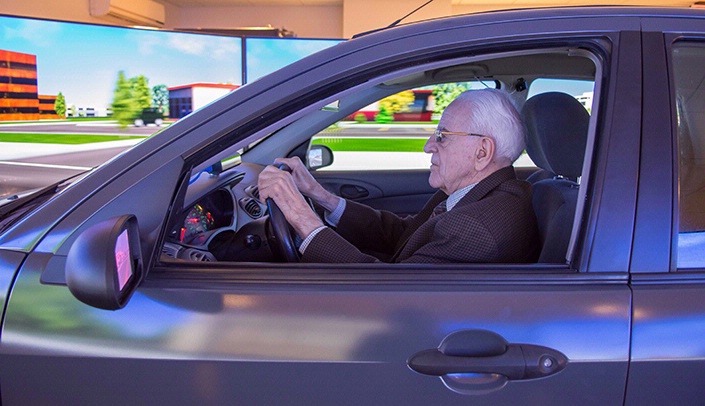SENSEI. PARSEC. VENUS.
These three words may indicate this story is about a karate master who wants to know the distance to one of Earth’s nearby planets.
Instead, this is about the new Mind and Brain Health Labs (MBHL) created by UNMC and its clinical partner, Nebraska Medicine.
The labs are a linchpin of a broader Mind and Brain Health Initiative to further establish UNMC/Nebraska Medicine as a national and global force in the neurological sciences – neurology, neurosurgery, psychiatry, psychology, anesthesia pain management and spine – providing the highest quality care across the lifespan, said Matthew Rizzo, M.D., professor and chair of neurological sciences and lead physician in the neuroscience service line.
The labs support a suite of advanced research tools including driving simulation and real-world data recording systems unlike those in any other medical institution, Dr. Rizzo said. These include:
A large high-fidelity driving simulator featuring a real full-sized automobile and an ultra-high definition wraparound visual display with better resolution than the human retina. Named SENSEI (Simulator for Ergonomics, Neuroscience, Safety Engineering and Innovation), the simulator will be used for multidisciplinary research studies with collaborators across UNMC and the University of Nebraska system.
A smaller advanced clinical driving simulator that fits in an exam room and will be used to help diagnose functional deficits and aid patients in their recoveries. Named PARSEC (Performance and Rehabilitation Simulator for Embodied Cognition), this simulator will aid in the care of patients with conditions such as Alzheimer’s disease, Parkinson’s disease, stroke, multiple sclerosis and peripheral neuropathy. Another simulator named SENSE (Simulator for Ergonomics Neuroscience and Scenario Engineering) is being used to program virtual environments and scenarios for testing drivers on the other simulators.
An instrumented vehicle called VENUS (Vehicle for Ergonomics, NeUroscience and Safety) that can be used to test research subjects in actual on-road driving experiences.
Special “black box” data recorders are being built and deployed by the MBHL. They can be placed in a driver’s own vehicle to test driving behavior in the real world, providing many years of continuous data collection and a treasure trove for health researchers around the world.
Dr. Rizzo is using this technology for a clinical study of older driver mobility and safety.
“We aim to immerse people in a realistic environment with all cylinders running,” Dr. Rizzo said. “The simulators provide realistic challenges to assess critical aspects of human performance and cognition – attention, decision making and memory all at once, under pressure of time. We can learn a lot about driver safety and risk and nobody gets hurt.”
